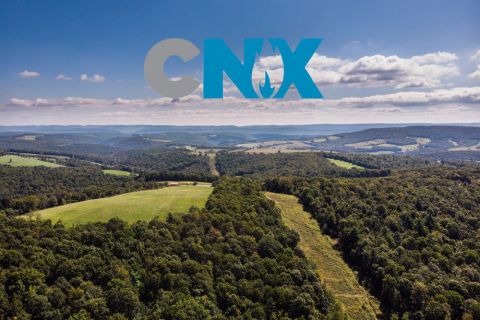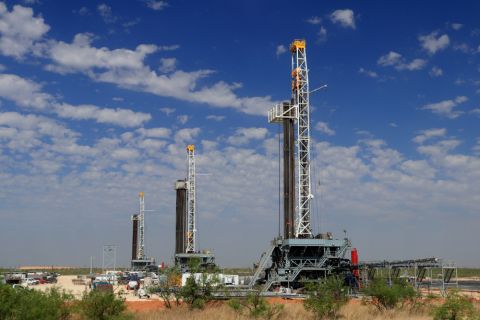Signaling faith that North American natural gas will be a hot commodity for years to come, Shell Oil Co. launched a $2.2-billion takeover bid for Denver independent producer Barrett Resources Corp. After initially rejecting the offer, Barrett's board of directors agreed to reconsider, but the market obviously believed at press time that the independent could find a sweeter deal. BRR skyrocketed some 34% on the news and was trading about $7 higher than Shell's $55-per-share bid. "Shell will certainly have to up its offer in light of where the market is," says Brad Beago, E&P analyst for Credit Lyonnais Securities (USA). "I don't think there's any way people are going to tender their shares to Shell at $55 with the market at $62." Shell revealed on March 7 that it approached Barrett's board six days earlier with the cash offer, which was a 24% premium to the stock's market price at the time and represented a $1.8-billion cash value, plus the assumption of $400 million in debt. Barrett's board rejected the deal, claiming the proposal is based solely on publicly available data and did not take into consideration any confidential information about the company's future potential. The stock had jumped to more than $61 per share. Executives opened a dataroom and were soliciting bids from other potential buyers, including Shell at press time. Goldman, Sachs & Co. and Petrie Parkman are advising Barrett. Shell chose the hostile road, however, and has taken the $55-per-share proposal directly to Barrett shareholders and filed lawsuits. Barrett's board changed the company's bylaws to remove provisions that restrict shareholders from voting by written consent. Shell was pleased but urged the removal of any other takeover defense mechanisms that still may be in place. A Shell spokeswoman says the litigation would continue until Barrett completely dismantles its takeover defense. Analysts' views E&P securities analysts are mixed in their assessments of the offer. The possibility is strong that a higher offer may emerge, but Shell's intention to retain a good portion of the Barrett staff makes it an attractive suitor. Beago says a $65-per-share offer is more in line. Only a major oil company would have enough cash to pull off such a deal, but large independents may be willing to attempt a stock-for-stock arrangement. "You could certainly see a large independent come in with a stock deal that could value it at $70," he says. Adding to the speculation is electric-power generation companies' ever-growing desire to own gas reserves, ensuring supply in tight markets. For example, Calpine Corp. 's goal is to own 25% of the gas reserves needed to run its plants. The San Jose, California, independent power supplier recently agreed to spend US$1.2 billion to purchase Encal Energy Ltd. , a Calgary producer. As Calpine's fuel needs grow, future acquisitions could occur in Canada as well as in the Gulf of Mexico, Gulf Coast, Sacramento Basin, San Juan Basin and Rockies, Calpine executives have said. "I think the Calpines and the Dynegys of the world are an interesting twist," Beago says. "Calpine has been willing to pay up, and certainly under their structure it appears they can afford to pay up for reserves in the ground." UBS Warburg LLC analyst William Featherston notes that Shell Oil's bid represents an implied price of $1.60 per thousand cubic feet of gas equivalent (Mcfe), which is cheaper than two other recent bids for U.S. E&P companies by integrated oils. Marathon Oil 's December offer for Pennaco Energy , another Rockies gas player, was $2.11 per Mcfe, and Amerada Hess Corp. 's February bid for Llog Exploration 's Gulf of Mexico gas assets was $2.08 per Mcfe. On a barrel of oil equivalent (BOE) basis, Moody's Investors Service says the deal looks expensive, at just under $10 per proved BOE. Beago says $10 per BOE is about $1 above the group average. "But given current gas prices and the outlook for strong gas prices going forward, $11 to $12 per BOE in the ground would not be outrageous." Irene Haas, who covers Barrett for Sanders Morris Harris in Houston, says the $55-per-share offer is in an acceptable range for Barrett. Her most recent price target was $64. Shell intends to retain most of Barrett's employees in Denver because they have the expertise to explore in the Rockies, she adds. Shell does not have a physical exploration and production presence in the region and would expect to make Denver its new base of operations in the Rockies. "To find another possible suitor that would have the balance sheet and the financial flexibility to make an offer larger than that-and, secondarily, to be able to pick up the staff-would be limited," Haas says. "There is not a huge selection of companies out there that are capable of doing both." Names that analysts have thrown out as possible suitors for Barrett include majors Exxon Mobil , Phillips and BP ; U.S. independents Anadarko Petroleum , Burlington Resources and Apache Corp. ; Canadian independents Alberta Energy , Anderson Exploration and PanCanadian Petroleums and electric-power generators Calpine and Duke Energy . Debt rating services looked favorably on the Shell-Barrett news. Moody's placed Barrett's Ba1-rated senior unsecured notes under review for possible upgrade. It indicated that it is likely to affirm the assessments if the Shell acquisition does not occur. Standard & Poor's placed its BB+ assessment of Barrett on watch, with positive implications. Barrett's assets Most of Barrett's properties are in the Rockies in Colorado, Wyoming and Utah; the Midcontinent in Kansas and Oklahoma; and the Gulf of Mexico. In 2000, it increased its gas production 18% year-to-year to an average 307 million cubic feet (MMcf) per day. Gas accounted for 96% of total production on an energy equivalent basis. The Piceance Basin accounted for 32% of production, Powder River Basin coalbed methane accounted for 21%, and Wind River Basin properties accounted for 18%. The company achieved a 21% increase in proved reserves in 2000 to total 1,372 billion cubic feet of gas equivalent (Bcfe) comprised of 1,323 Bcf of gas and 8.1 million barrels of oil and condensate. It replaced 302% of 2000 production of 118 Bcfe, at an all-in finding cost of 82 cents per Mcfe. The Rockies hold 88% of the company's proved reserves, an increase from 81% in 1999. The company's reserve life was 11.7 years at the end of 2000. The addition of Barrett to Shell Oil's portfolio is part of its quest to build on its position as the fourth-largest gas producer in the United States. The major likely wouldn't stop there. Tyler Dann, who covers Shell for Banc of America Securities LLC in Houston, says that major could pursue other North American gas producers such as Burlington and PanCanadian, whether or not the Barrett deal goes forward. "I really view this as a first-stage transaction," Dann says. "It's possible that more transactions will come down the pike from this company. I would view this as sort of an entrée, or an opening salvo." Dain Rauscher Wessels E&P analyst Ray Deacon doesn't see Burlington as an acquisition target. "Shell, in our opinion, will not make a bid for Burlington despite the $10 billion of cash on its balance sheet and significant free cash flow generation. While Shell has said it aims to acquire additional gas reserves in the Rockies we do not think Burlington's assets are a good fit with Shell." Stocks of several gas producers and midstream companies got a lift from the Shell-Barrett situation, spurred by speculation that more gas-related consolidation may be coming. Subash Chandra of Morgan Keegan & Co. says Mitchell Energy & Development Corp., Evergreen Resources Inc. , Western Gas Resources Inc. and Cross Timbers Oil Co. are especially poised to benefit. "We have long been advocating the sale of E&P shares during the peak consumption months and aggressive purchase in the subsequent dips during the shoulder months [April to May and September to October]," Chandra says. However, lingering cold weather and the Shell-Barrett situation "strongly suggest that E&P stocks will be hot investments through this summer, allowing few opportunities to buy the dips ahead of what we believe could be record summer prices." Featherston says attractive smaller-capitalization acquisition candidates include Evergreen Resources, HS Resources Inc. and Tom Brown Inc. Larger-cap stocks that could rally with the news of a major buying an E&P company include Burlington Resources, Kerr-McGee Corp. , Ocean Energy Inc. and Unocal Corp. (Burlington's stock was already climbing when Shell announced its bid for Barrett but it fell when it announced a $30-million dry hole in the Madden Field of central Wyoming.) Featherston says, "We do not believe this begins a trend of the supermajors buying E&Ps. The more likely consolidation trend will be larger E&P companies and middle-tier integrateds (e.g., Phillips) buying smaller, lower-valued U.S. independents, as well as the continued consolidation of the Canadian E&P sector."
Recommended Reading
CNX, Appalachia Peers Defer Completions as NatGas Prices Languish
2024-04-25 - Henry Hub blues: CNX Resources and other Appalachia producers are slashing production and deferring well completions as natural gas spot prices hover near record lows.
Barnett & Beyond: Marathon, Oxy, Peers Testing Deeper Permian Zones
2024-04-29 - Marathon Oil, Occidental, Continental Resources and others are reaching under the Permian’s popular benches for new drilling locations. Analysts think there are areas of the basin where the Permian’s deeper zones can compete for capital.
CEO: Continental Adds Midland Basin Acreage, Explores Woodford, Barnett
2024-04-11 - Continental Resources is adding leases in Midland and Ector counties, Texas, as the private E&P hunts for drilling locations to explore. Continental is also testing deeper Barnett and Woodford intervals across its Permian footprint, CEO Doug Lawler said in an exclusive interview.
TPH: Lower 48 to Shed Rigs Through 3Q Before Gas Plays Rebound
2024-03-13 - TPH&Co. analysis shows the Permian Basin will lose rigs near term, but as activity in gassy plays ticks up later this year, the Permian may be headed towards muted activity into 2025.
Sangomar FPSO Arrives Offshore Senegal
2024-02-13 - Woodside’s Sangomar Field on track to start production in mid-2024.





